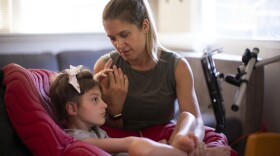We wanted to follow up on our story about the ultra-Orthodox women in Israel who were running for the local council in El'ad, or Forever God, a small, religious Jewish town.
Five women had challenged not only El'ad's norms, but practices across Israel's various ultra-Orthodox communities just by getting their names on the ballot and running a campaign.
None of them won a seat, but they say they will be back.
"We're not giving up," said Michal Chernovitsky, the leader of Mothers for El'ad, after learning her small coalition of candidates won 260 votes in a community of 17,000 eligible voters.
A minimum of 740 votes was needed to win a spot on the council. Despite earning only a third of that, Chernovitsky, who is ultra-Orthodox, felt victorious.
"We are happy that some people want women [on the council] in an ultra-Orthodox town," she said. "This is amazing to me."
This may also be a reflection of both internal differences and external pressures on Israel's fast-growing ultra-Orthodox population.
All ultra-Orthodox - "Haredi" in Hebrew - are not cut from the same cloth.
Ethnic divides play out in ultra-Orthodox power struggles as they do in the rest of Israel.
Subsects follow different religious leaders, wear different clothes, and hold different attitudes, even toward Israel.
Outside pressure is also challenging ultra-Orthodox communities, which have clashed repeatedly with less strict religious sectors of Israeli society over practices such as separating men and women on public transportation, or walkways in ultra-Orthodox neighborhoods.
The most high-profile fight, over requiring ultra-Orthodox men to serve in the Israeli military, will be dealt with again in a new session of parliament. And as Haredi society grows, the battle lines blur.
One new ultra-Orthodox political movement supports the draft, along with greater integration into wider Israeli society.
That group sticks to tradition in at least one way. Its slate of candidates was all men.
Copyright 2021 NPR. To see more, visit https://www.npr.org. 9(MDAxNzg0MDExMDEyMTYyMjc1MDE3NGVmMw004))






